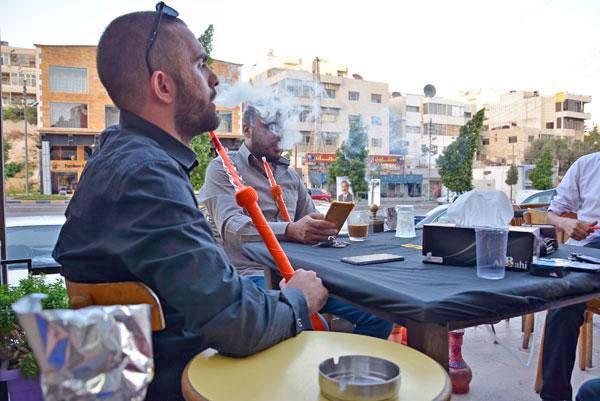You are here
Shisha banned in restaurants, cafés as gov't tightens response to global virus outbreak
By Maram Kayed - Mar 14,2020 - Last updated at Mar 14,2020

Shisha will no longer be served in restaurants and cafés, and it is also banned from being delivered to homes or rented, according to new regulations to counter the spread of the novel coronavirus (JT file photo)
AMMAN — As an additional measure to counter the spread of the novel coronavirus, the Ministry of Local Administration announced on Saturday that shisha will no longer be served in restaurants and cafés, and is also banned from being delivered to homes or rented.
In an official letter to the heads of municipalities and joint service councils, Minister of Local Administration Walid Masri said that the decision was “based on the recommendations of the vice president of the National Centre for Security and Crisis Management”.
The executive committee tasked with addressing the spread of the virus in the Kingdom sent similar suggestions to the ministry, according to the official letter, which was later published online.
Masri also required public and private institutions to replace their fingerprint clocking-in systems with “any other suitable means”.
Mayor of Amman Yousef Shawarbeh sent another official letter with the same announcement to shop owners and malls, stressing that they should “take all necessary precautions to prevent the spread of the coronavirus”.
Shawarbeh noted that any party that violates this decision “will expose itself to accountability and the severe legal procedures that follow”.
Workers in restaurants and cafés, including Hamadah Odai, a waiter in a cafe, told The Jordan Times that they “saw this coming".
Odai, who works in two different cafés, told The Jordan Times on Saturday that overall cafe activity, but particularly demand for shisha, have been gradually waning since February. Shisha was the first to see a decrease in demand, followed by food and drinks.
“We tried our best to make customers feel safe by offering hand sanitiser after meals and assuring them that all ingredients going into the meals have been thoroughly cleaned and prepared in sanitised kitchens, but people are still scared, which is understandable,” he said.
President of the Restaurant Owners’ Association Omar Awwad, however, said that the decision was “expected, welcomed and even demanded by citizens”.
He told The Jordan Times over the phone that “Jordan’s state is better than its regional neighbours, but to stay that way, these precautions have to be taken. Unfortunately, this could mean severe losses for restaurants and cafe owners, and in turn, their employees and the economy”.
Tourist Restaurants Association President Issam Fakhreddine also expressed fear of the impact the new regulations could have on the tourism and service sectors, warning in a statement against closing down restaurants and hotels in Jordan if the crisis persists.
He noted that the percentage of losses for tourist restaurants has reached 50 per cent and that “Jordan today has no market to compensate for losses”.
Related Articles
AMMAN — The restaurants and cafés sector is not only the most affected due to the pandemic, but also “the most financially distressed busine
AMMAN — In a telltale sign of a creeping crisis, “for sale” notices are dotting the walls of restaurants, clothes and mobile shops all
AMMAN — The losses of restaurants and cafes as a result of their forced closure for two weeks amount to approximately JD20 million, Presiden











